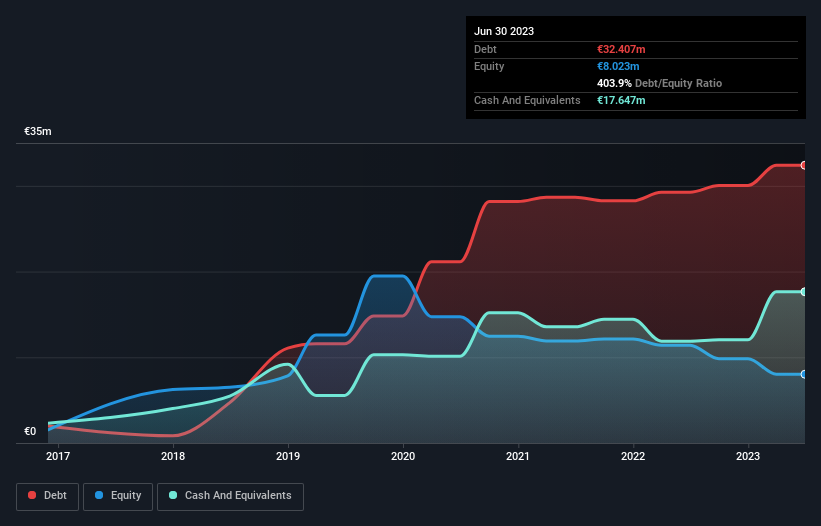The external fund manager backed by Berkshire Hathaway's Charlie Munger, Li Lu, makes no bones about it when he says 'The biggest investment risk is not the volatility of prices, but whether you will suffer a permanent loss of capital.' It's only natural to consider a company's balance sheet when you examine how risky it is, since debt is often involved when a business collapses. Importantly, Mare Nostrum SA (EPA:ALMAR) does carry debt. But the real question is whether this debt is making the company risky.
What Risk Does Debt Bring?
Debt is a tool to help businesses grow, but if a business is incapable of paying off its lenders, then it exists at their mercy. In the worst case scenario, a company can go bankrupt if it cannot pay its creditors. However, a more common (but still painful) scenario is that it has to raise new equity capital at a low price, thus permanently diluting shareholders. Of course, debt can be an important tool in businesses, particularly capital heavy businesses. The first thing to do when considering how much debt a business uses is to look at its cash and debt together.
View our latest analysis for Mare Nostrum
How Much Debt Does Mare Nostrum Carry?
You can click the graphic below for the historical numbers, but it shows that as of June 2023 Mare Nostrum had €32.4m of debt, an increase on €29.3m, over one year. On the flip side, it has €17.6m in cash leading to net debt of about €14.8m.

How Strong Is Mare Nostrum's Balance Sheet?
According to the last reported balance sheet, Mare Nostrum had liabilities of €78.0m due within 12 months, and liabilities of €14.2m due beyond 12 months. On the other hand, it had cash of €17.6m and €54.5m worth of receivables due within a year. So its liabilities total €20.0m more than the combination of its cash and short-term receivables.
The deficiency here weighs heavily on the €5.83m company itself, as if a child were struggling under the weight of an enormous back-pack full of books, his sports gear, and a trumpet. So we definitely think shareholders need to watch this one closely. After all, Mare Nostrum would likely require a major re-capitalisation if it had to pay its creditors today. The balance sheet is clearly the area to focus on when you are analysing debt. But it is Mare Nostrum's earnings that will influence how the balance sheet holds up in the future. So when considering debt, it's definitely worth looking at the earnings trend. Click here for an interactive snapshot.
In the last year Mare Nostrum wasn't profitable at an EBIT level, but managed to grow its revenue by 6.4%, to €176m. We usually like to see faster growth from unprofitable companies, but each to their own.
Caveat Emptor
Importantly, Mare Nostrum had an earnings before interest and tax (EBIT) loss over the last year. Its EBIT loss was a whopping €1.7m. If you consider the significant liabilities mentioned above, we are extremely wary of this investment. Of course, it may be able to improve its situation with a bit of luck and good execution. But we think that is unlikely since it is low on liquid assets, and made a loss of €3.3m in the last year. So we think this stock is quite risky. We'd prefer to pass. There's no doubt that we learn most about debt from the balance sheet. But ultimately, every company can contain risks that exist outside of the balance sheet. Case in point: We've spotted 3 warning signs for Mare Nostrum you should be aware of, and 2 of them are a bit concerning.
When all is said and done, sometimes its easier to focus on companies that don't even need debt. Readers can access a list of growth stocks with zero net debt 100% free, right now.
New: Manage All Your Stock Portfolios in One Place
We've created the ultimate portfolio companion for stock investors, and it's free.
• Connect an unlimited number of Portfolios and see your total in one currency
• Be alerted to new Warning Signs or Risks via email or mobile
• Track the Fair Value of your stocks
Have feedback on this article? Concerned about the content? Get in touch with us directly. Alternatively, email editorial-team (at) simplywallst.com.
This article by Simply Wall St is general in nature. We provide commentary based on historical data and analyst forecasts only using an unbiased methodology and our articles are not intended to be financial advice. It does not constitute a recommendation to buy or sell any stock, and does not take account of your objectives, or your financial situation. We aim to bring you long-term focused analysis driven by fundamental data. Note that our analysis may not factor in the latest price-sensitive company announcements or qualitative material. Simply Wall St has no position in any stocks mentioned.
About ENXTPA:ALMAR
Good value with slight risk.
Similar Companies
Market Insights
Community Narratives





